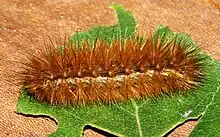| Buff ermine | |
|---|---|
 | |
 | |
| Scientific classification | |
| Domain: | Eukaryota |
| Kingdom: | Animalia |
| Phylum: | Arthropoda |
| Class: | Insecta |
| Order: | Lepidoptera |
| Superfamily: | Noctuoidea |
| Family: | Erebidae |
| Subfamily: | Arctiinae |
| Genus: | Spilarctia |
| Species: | S. luteum |
| Binomial name | |
| Spilarctia luteum (Hufnagel, 1766) | |
| Synonyms | |
|
List
| |
The buff ermine (Spilarctia luteum) is a moth of the family Erebidae. It is sometimes placed in the genus Spilosoma. The species was first described by Johann Siegfried Hufnagel in 1766. It is found throughout the temperate belt of the Palearctic region south to northern Turkey, Georgia, Kazakhstan, southern Siberia (excluding Buryatia), eastern Mongolia, Amur Region, China, Korea and Japan.
The wings of this species are buffish yellow (the males tend to be more yellow than the females) and are typically marked with a diagonal row of dark spots on the forewing and a few other scattered spots on both forewings and hindwings. The extent of black markings varies considerably, however, from almost spotless examples to largely black melanic forms. The wingspan is 34–42 mm. The species flies from May to July in the British Isles. This may vary in other parts of the range. It is attracted to light.
The larva is pale brown and very hairy. It is polyphagous, feeding on a wide variety of trees, shrubs and herbaceous plants (see list). This species overwinters as a pupa.
Recorded food plants
Subspecies
- Spilarctia lutea lutea
- Spilarctia lutea adzharica Dubatolov, 2007 (Georgia)
- Spilarctia lutea japonica (Rothschild, 1910) (Middle Amur, Primorye, southern Sakhalin, southern Kuril Islands, eastern China, Korea, Japan)
- Spilarctia lutea rhodosoma (Turati, 1907) Sicily, the black of the upperside is increased by a larger number of the spots; but especially distinguished by the bright red abdomen.
Gallery
 Buff ermine moth (Spilarctia luteum) caterpillar
Buff ermine moth (Spilarctia luteum) caterpillar Pupa
Pupa Pair of buff ermine moths
Pair of buff ermine moths
References and notes
- ↑ Robinson, Gaden S.; Ackery, Phillip R.; Kitching, Ian J.; Beccaloni, George W.; Hernández, Luis M. (2010). "Entry for Spilarctia luteum". HOSTS - A Database of the World's Lepidopteran Hostplants. Natural History Museum, London. Archived from the original on 8 August 2020. Retrieved 18 October 2017.
- ↑ "Buff Ermine Spilosoma luteum". Butterfly Conservation. 2022-06-02. Retrieved 2022-06-02.
- Chinery, Michael (1991). Collins Guide to the Insects of Britain and Western Europe.
- Skinner, Bernard (1984). The Colour Identification Guide to Moths of the British Isles.
External links
- Savela, Markku. "Spilarctia lutea (Hufnagel, 1766)". Lepidoptera and Some Other Life Forms. Retrieved September 28, 2019.
- Hlasek, Josef Lubomir "Spilosoma luteum ab6369". Photo Gallery Wildlife Pictures.
- "Taxonomy Browser: Spilosoma lutea". Barcode of Life Data System (BOLD). Retrieved September 28, 2019.
- Spilosoma lutea at EoL
- Beccaloni, G.; Scoble, M.; Kitching, I.; Simonsen, T.; Robinson, G.; Pitkin, B.; Hine, A.; Lyal, C., eds. (2003). "Spilosoma lutea". The Global Lepidoptera Names Index. Natural History Museum. Retrieved April 19, 2018.
- "10566 Spilarctia lutea (Hufnagel, 1766) - Gelber Fleckleibbär". Lepiforum e.V.. Retrieved September 28, 2019.